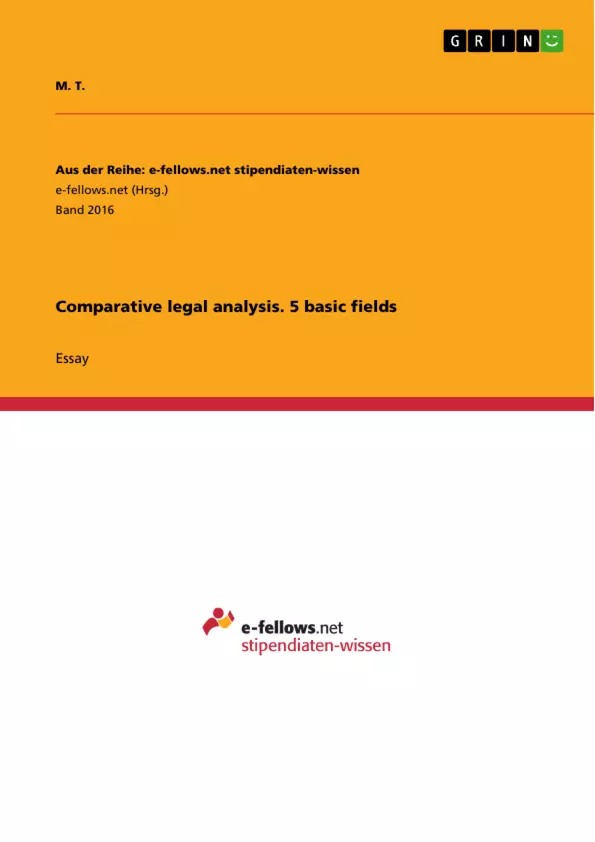In times of globalization and internationalisation comparative legal studies play an ever more important role. Especially against the backdrop of trying to foster understanding of different cultures as well as to enhance the development of domestic legal systems and thereby improve one’s own law , comparative law studies are becoming increasingly significant.
Comparative legal studies can be defined as the purposeful analysis of different laws or legal systems through the use of one or more approaches. Comparative law consists of the fields ‘private international law’, ‘the making of law’, ‘the interpretation and application of the law’, ‘the confluence of the law and the development of general common principles’ and ‘the unification of the law’ .
The aim of this essay is to explain these five basic fields in which comparative legal studies are employed and to illustrate these subjects by giving examples.
Inhaltsverzeichnis (Table of Contents)
- Private international law
- Making law
- Interpretation and application of law
- Confluence of the law and development of general common principles
- Unification of the law
Zielsetzung und Themenschwerpunkte (Objectives and Key Themes)
This essay aims to explain the five basic fields in which comparative legal studies are employed and to illustrate these subjects by giving examples. It will examine the role of comparative law in private international law, making law, the interpretation and application of the law, the confluence of the law, and the unification of the law.
- The influence of comparative legal studies on private international law.
- The impact of comparative law on the making of law.
- The role of comparative legal studies in the interpretation and application of law.
- The significance of comparative law in the confluence of the law and the development of general common principles.
- The use of comparative law in the unification of the law.
Zusammenfassung der Kapitel (Chapter Summaries)
The first chapter examines the role of comparative law in private international law, which is also known as conflict of laws. It discusses the interaction between comparative law and private international law, highlighting the importance of comparative law in determining which legal system should be applied in cases with foreign connections. The chapter provides an example of the case Conklin v Horner, which demonstrates how courts often choose the "better" law among potentially applicable ones in cases with foreign connections.
The second chapter explores the influence of comparative legal studies on making law. It discusses how comparative law can be used to reform domestic legal systems and to give legal effect to social changes that are shared by foreign countries. The chapter illustrates this point by referencing the concept of the German limited liability company, which served as a model for the development of similar corporate forms in other countries.
The third chapter examines the role of comparative legal studies in the interpretation and application of law. It discusses how comparative law can assist in the construction of national rules when they are doubtful or incomplete. The chapter provides an example of the case Greatorex v Greatorex, which demonstrates how courts often refer to foreign case decisions when applying domestic law.
Schlüsselwörter (Keywords)
The main keywords and focus topics of this text include comparative legal studies, private international law, conflict of laws, making law, interpretation and application of law, confluence of the law, unification of the law, foreign connections, domestic legal systems, reform, legal effect, social change, general common principles, and cross-citations.
Frequently Asked Questions
What is the definition of comparative legal studies?
Comparative legal studies is the purposeful analysis of different laws or legal systems using one or more approaches to foster cultural understanding and improve domestic law.
What are the five basic fields of comparative law?
The five fields are: private international law, the making of law, the interpretation and application of law, the confluence of law and common principles, and the unification of law.
How does comparative law assist in the making of law?
It serves as a model for legal reform. For example, the German limited liability company (GmbH) model has been used by other countries to develop their own corporate legal structures.
What is the role of comparative law in private international law?
It helps courts determine which legal system is most appropriate in cases with foreign connections, sometimes allowing them to choose the "better" law among applicable ones.
How do courts use comparative law for interpretation?
Courts often refer to foreign case decisions and legal principles when national rules are doubtful, incomplete, or require a broader perspective to be applied correctly.
Why is globalization important for comparative law?
Globalization increases international interactions, making it essential to understand different legal cultures to harmonize laws and resolve cross-border legal conflicts effectively.
- Citation du texte
- M. T. (Auteur), 2016, Comparative legal analysis. 5 basic fields, Munich, GRIN Verlag, https://www.grin.com/document/336952



